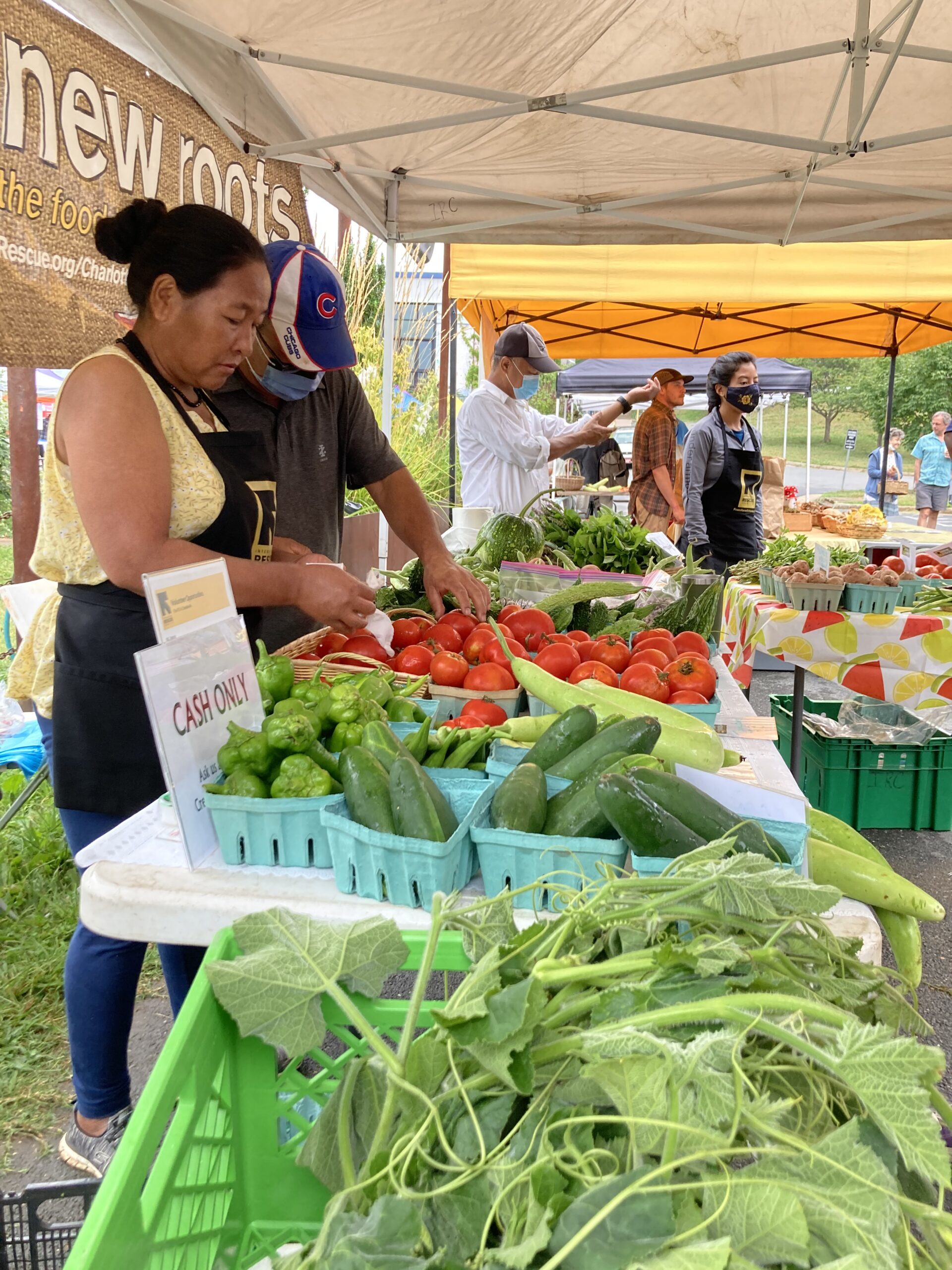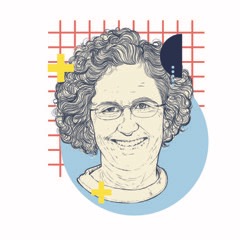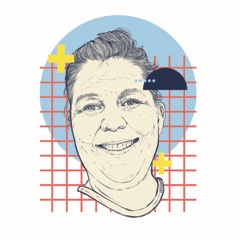
Market managers are the unsung heroes of our local markets
Illustrations by Roshi K
In the food and agriculture industry, there are countless jobs that go overlooked. Among the many heroes who help put food on our plates are farmers market managers. Virginia is home to a staggering 265 farmers markets. Though it is often a magical experience, in reality, the market is an intricate system of managing permits, meeting regulations, coordinating schedules, supporting vendors and being at the mercy of weather patterns and customer whims. We sat down with four managers from across the region who work year-round to cultivate a space for access to healthy, local food.

Halee Johnson — Harrisonburg Market
How did you become a market manager?
I’m from a really small town, so we didn’t have a farmers market there. I remember my sophomore year [JMU] — when I moved off campus, I was so excited about the farmers market being in town and I remember the first time I went, there was a giant box of tomatoes, seconds, for sale for $5. It was a steal. I told my roommate, we have to buy these tomatoes … and I ended up giving them away to our neighbors and it helped us meet all the people living around us and I’ve just been in love with the Harrisonburg market ever since.
What are some behind-the-scenes tasks of the job?
So many tiny things that are constantly being juggled: onboarding new vendors, supporting people who are applying to vend, working with our board from accepting those vendors to finding policies, creating policies, addressing any vendor or customer concerns. I’m in charge of all our finances so bookkeeping, grant reporting, marketing and, of course, answering phone calls and emails. Sometimes I’ll work with other market managers or go work for vendors, just to learn about them. We have a website that has to be maintained, maintaining supplies, sending out vendor maps …
What is your favorite part of the job?
Definitely our vendors, each one of them has such an amazing story of how they got to where they are. I feel like it’s against the status quo to open a small business, selling a product that you really, really care about and put so much love into. So my favorite thing is learning their stories and getting to share those stories with customers.
What do you like to cook with your market purchases?
Food has been a part of my life for forever; I mean, it’s a part of everyone’s life, but I feel like I was raised in the kitchen alongside my mom and my dad and my aunts, and I always just loved cooking. I love butternut squash and that’s something we have all winter — stuffed butternut with mushrooms and walnuts, or I made a recipe last year of butternut mac ‘n’ cheese that’s super delicious.

Dorothy McIntyre — Manager & Founding Member, Forest & Moneta Markets
How did you become a market manager?
I called the county and asked why there wasn’t a Forest market because at the time Forest was the most densely populated area in the county. … In my previous life I was a nurse … then my daughters played travel volleyball, so I had been scheduling for all the tournaments, but I didn’t have a background in farming or management or types of things like that … it wasn’t the same but it kind of was because I was still trying to bring people together.
How many customers attend the market, on average?
We average anywhere from 1300-1900 people each market day [Forest market]. We started the Moneta market in May — it’s a brand new market, so we don’t have counts yet; it just needs to get its name out.
How many vendors are at the Forest market?
We started with 11 vendors [in 2011]. There are four still at the market from those 11. Now, we average around 40. It’s a big market. I try not to go over 50, it gets me very anxious, we’re almost outgrowing the space.
What’s a part of the job most people aren’t aware of?
The layout. I think about each vendor’s personality … I don’t want to put a seriously outgoing person next to an introvert because it just makes them uncomfortable … all the vendors are very thoughtful. They’re supportive of one another. Sometimes it might take a little bit for a new vendor to open up, so I’ll put them next to somebody I know. It’s a supportive kind of thing and a lot of the older veteran vendors will go and help new vendors and say, hey listen, if you do this or that, you might have good sales … they all work together. They know if their neighbor does well, they’ll do well, and the market as well.

Cecile Gorham — Manager & Founding Member, Farmers Market and Sunset Market at IX Art Park
How did you become a market manager?
Well, I actually was a vendor for a while. Once you start going to farmers markets, you pay attention to the management and how it’s run, how it’s operated. There are rules and regulations. And so I got kind of interested in that, and I started being a substitute for one of the managers there [Charlottesville City Market]. We started realizing that there was this whole market that you could tap into to meet these vendor and grower needs and customer needs. … We formed Market Central, which was actually passed along from some older ladies who had visions about the market in the community, too … And so they had what they called the friends of the market, and then a couple of vendors and myself kind of took what they started and formalized it. And we called ourselves Market Central. So one of the main programs that we brought to the market was the SNAP and debit program.
How many customers attend the market, on average?
About 3000. A bit more in the summer, less in the winter. We have anywhere from 75-80 vendors in the summer and about 50-60 in the winter.
What do you think customers who attend the market should know?
Using cards is expensive, they [customers] use so many cards now and it’s 3%. The vendors have to pay that 3%! … One thing I do wish they would participate better in is composting and recycling and dealing with the trash.
What is your favorite part of the job?
The people. I love seeing the people that are shopping and how much they enjoy it. Helping vendors, helping newcomers starting new business, helping them, having people discover their products. You know, there’s just that … feeling good that so many good things are happening in our state.

Connie Kenny — LEAP Grandin, West End & Mobile Markets
How did you become a market manager?
I got into the markets because my child had a lot of food allergies and at the time I really didn’t know where to go. And so I found the West End and Grandin Farmers Market and I just instantly fell in love with the community aspect of it.
What is a challenge farmers markets face?
I feel like people’s perception of food needs to be picture perfect. There is such a disconnect in our food system right now, and I always say real food comes dirty.
What’s a part of the job the average person might not be aware of?
You know, when we moved the West End Market, I spent a lot of time canvassing, going door to door, talking about the markets, talking about the vendors, talking about every incentive program, advocating for the programs. I don’t think a lot of people realize that to start a community market, you have to kind of plant what I call the seed. You plant a seed, you’ve got to water it and you’ve got to nurture it, you’ve got to build on that. And that’s really what building the trust up in these neighborhoods is like and once you build that trust, they kind of start to see you …
You sit back and watch it grow. Their testimony is sort of like, I wouldn’t have fresh food if you weren’t here. … Being able to offer kids $5 to shop at a weekly market. And what they’re doing is they’re taking that $5 and they’re buying their apples for snacks. We’re giving children the opportunity to learn decision making, arithmetic, to build confidence.
What is your favorite part of the job?
For me, it’s being a positive impact both on local agriculture and in the wellbeing of my neighbors and making sure everyone has access to affordable local food. I just love how everybody eats. And I know that sounds weird, but no matter who you are or where you are or what you’re doing, we all eat. We all integrate, so it’s like everyone’s just waving a peace flag above every farmers market and we’re all here together, eating, watching, supporting local goodness.
This article first appeared in our 2023 Winter Issue, Local Heroes.
